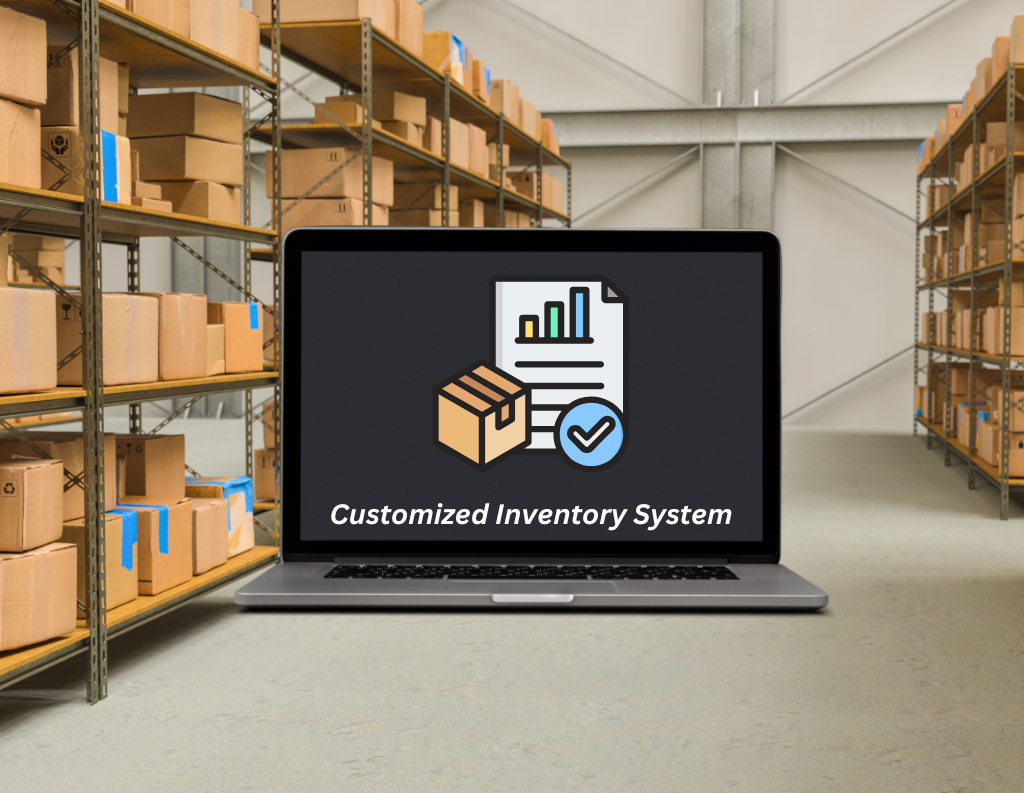Running a small business is a balancing act, especially when it comes to managing inventory. From tracking stock levels to processing orders and handling customer demands, keeping everything in check can feel overwhelming. However, this is where a customized inventory system can make all the difference. Unlike off-the-shelf solutions, a customized system is built to meet your specific needs. As a result, it helps you streamline processes, reduce manual work, and boost operational efficiency.
In this article, we’ll explore how a customized inventory system can transform inventory management for small businesses.

What is a Customized Inventory System for Business?
A customized inventory system is software tailored to fit your business’s needs and workflows. Unlike generic inventory software, it doesn’t include unnecessary features or lack the ones you need. Instead, a customized system is designed around your processes. For instance, from real-time inventory tracking to generating specialized reports, this flexibility gives you complete control without added complexity.
Why Small Businesses Need a Customized Inventory System
Small businesses often have limited resources, so optimizing operations is crucial. Therefore, here are some benefits of a customized inventory system:
Real-Time Inventory Tracking
Real-time tracking helps you monitor inventory levels accurately. Consequently, it reduces the risk of stockouts or overstocking, both of which can cost money and customers.
For example, imagine you run a small online store where certain items sell quickly. With real-time tracking, you can reorder before items go out of stock. Thus, this helps avoid delays and keeps your customers happy.
Faster Order Processing and Fulfillment
A customized inventory system automates key steps like order entry and status updates. In turn, this reduces manual tasks, speeding up order fulfillment. Ultimately, faster processing leads to better customer satisfaction and loyalty.
For instance, a small retailer that fulfills orders in-house can benefit from automated order processing. With a customized system, stock and order details update automatically, freeing up time for other tasks.

Reduced Human Error
Manual inventory management is prone to errors. Therefore, a customized inventory system automates repetitive tasks, reducing common mistakes like data entry errors.
For example, in a small business, one data entry error can lead to inaccurate stock counts or misplaced orders. By automating, you help prevent these issues, saving money and improving customer experiences.
Detailed Reporting and Analytics
A customized inventory system provides tailored reporting and analytics. Moreover, insights into sales trends, inventory turnover, and demand help you make data-driven decisions. This way, you can optimize inventory, reduce costs, and improve profitability.
For example, a small wholesaler could use custom reports to identify best-selling items and adjust stock levels. As a result, this reduces waste and boosts cash flow by focusing on high-revenue products.
Key Features to Look For in a Customized Inventory System
When choosing a customized inventory system, it’s essential to know which features will bring the most value. Here are some key features to consider:
- User-Friendly Interface: A simple, intuitive design ensures that everyone can manage the system easily, without extensive training.
- Integration Capabilities: The system should integrate with existing software like accounting, POS, or CRM systems. This way, it creates seamless data flow and reduces manual entry.
- Scalability: Choose a system that can grow with your business. As your business expands, it should handle more inventory, orders, and locations as your needs evolve.
How to Get Started with a Customized Inventory System
If you’re ready to invest in a customized system, here are a few steps to get started:
- Evaluate Your Needs and Goals
Think about your challenges with inventory. Are stock accuracy or slow order processing major issues? By identifying your needs, you’ll be able to choose the right features for your business. - Set a Budget
Customized systems often have higher upfront costs, but the return on investment can be significant. Therefore, set a budget that accounts for both initial costs and long-term savings. - Choose the Right Provider
Look for a provider that specializes in systems for small businesses and understands your industry. Additionally, check reviews and ask for examples of previous work. Make sure they offer support and training to help you get the most from your system.
Key Features to Look For in a Customized Inventory System
When choosing a customized inventory system, it’s essential to know which features will bring the most value. Here are some key features to consider:
- User-Friendly Interface: A simple, intuitive design ensures that everyone can manage the system easily, without extensive training.
- Integration Capabilities: The system should integrate with existing software like accounting, POS, or CRM systems. This way, it creates seamless data flow and reduces manual entry.
- Scalability: Choose a system that can grow with your business. As your business expands, it should handle more inventory, orders, and locations as your needs evolve.
Conclusion: Invest in Efficiency with a Customized Inventory System
A customized inventory system can be a game-changer for small businesses. It helps streamline processes, reduce errors, and improve inventory decisions. By automating routine tasks and providing real-time insights, you’ll save time and money while creating a smoother experience for your customers.
In summary, if you’re ready to boost efficiency and take control of your inventory, a customized system might be the perfect step for growth.
